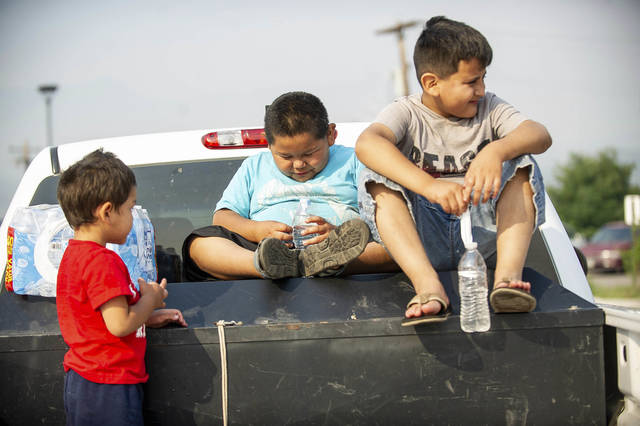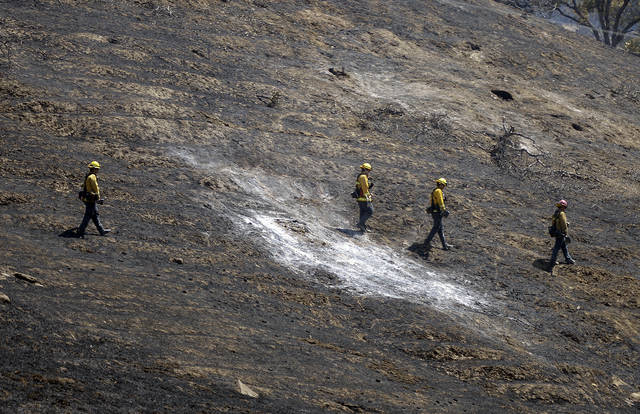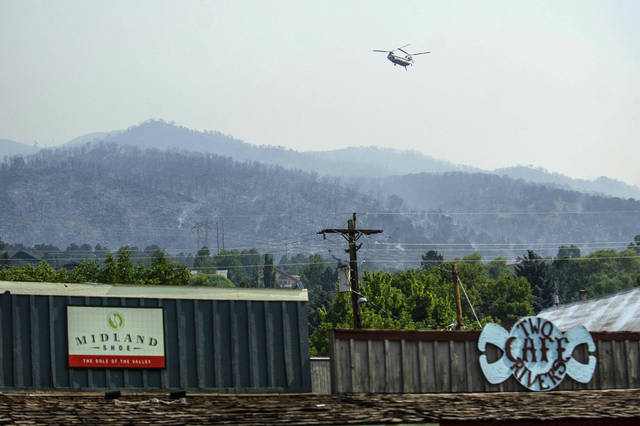DENVER — An erratic wildfire charging through extremely dry land in the heart of Colorado ski country destroyed three homes and forced people to flee in the middle of the night, authorities said Thursday.
Elsewhere in Colorado, a rare high-elevation tornado touched down at the site of another wildfire Thursday but apparently caused little damage and had no effect on the fire.
They were among more than 60 large blazes burning across the United States, mostly in the West, where whipping winds and increasing heat have made it easy for flames to spread.
Fires exploded in Northern California and in the Southwestern U.S., where a prolonged and severe drought has desiccated forests.
In Colorado, residents of multimillion-dollar properties, modest condos and mobile homes were ordered to evacuate early Thursday because of an unpredictable wildfire reported the night before near the town of Basalt. More than 500 homes were affected.
The Eagle County Sheriff’s Department said no other homes had been lost besides the three reported earlier.
Smoke from the fire temporarily halted flights into the resort town of Aspen, about 20 miles (32 kilometers) away.
Authorities believe the flames started after people at a shooting range used tracer bullets, which illuminate the path of fired bullets.
A tornado was reported Thursday south of Fairplay, a central Colorado town about 10,000 feet (3,000 meters) above sea level. It appeared to touch down at or near the edge of a wildfire that has burned about 17 square miles (43 square kilometers), National Weather Service meteorologist Russell Danielson.
Tornadoes are rare at that elevation and are seldom seen at any wildfire, Daniels said.
Another Colorado wildfire about 205 miles (330 kilometers) southwest of Denver destroyed more than 130 homes and forced more than 2,000 people in three counties to evacuate. It grew to about 160 square miles (nearly 420 square kilometers) Thursday.
Rain was expected in parts of Colorado, which could dampen fires but trigger flash flooding in areas left bare by wildfires.
Hotter, drier weather was forecast in Northern California, where thousands of firefighters were battling a massive wildfire that was already about three times the size of San Francisco.
The fire northwest of Sacramento had burned 134 square miles (347 square kilometers) by Thursday.
“The cool weather on Wednesday helped firefighters, but it will become hotter and drier starting Friday and into the weekend, and that will be a challenge,” said Anthony Brown, a spokesman with the California Department of Forestry and Fire Protection.
Some of the 2,500 people who were under mandatory evacuations orders were allowed to return home, but Brown said the blaze was still threatening about 1,000 buildings.
No structures have been damaged or destroyed and what started the blaze is still under investigation.
In northern New Mexico, a wildfire closed a ranch where novelist D.H. Lawrence once sought spiritual renewal. Officials said a fire in drought-stricken Carson National Forest has scorched nearly 4 square miles (10 square kilometers) since June 24 and is only partially contained.
Forest restrictions imposed last week closed the University of New Mexico’s D.H. Lawrence Ranch, which hosted the writer in the summers of 1924 and 1925 as well as Swiss psychiatrist Carl Jung, author Willa Cather and artist Georgia O’Keeffe after Lawrence’s 1930 death.
In Utah, scorching summer temperatures and winds quickly pushed flames through bone-dry vegetation near a popular fishing lake about two hours southeast of Salt Lake City. The 66-square-mile (171-square-kilometer) fire near Strawberry Reservoir has burned about 90 structures.
Darren Lewis’ family cabin is in the fire’s path and he fears the A-frame structure built 46 years ago by his uncle and father has burned, though he’s waiting for confirmation.
Lewis, 44, and his extended family planned to spend the Fourth of July at the property in a narrow canyon near a river but instead nervously watched social media for updates from the Salt Lake City suburb of Magna.
More than 1,100 people have been evacuated in the mountain area, and the family hasn’t been able to go back since Monday, he said. It is a frequent family gathering spot and has special sentimental value because his father and uncle both died last year.
“That’s our healing place,” Lewis said.
———
Associated Press writers Russell Contreras in Albuquerque, Dan Elliott in Denver, Brady McCombs in Salt Lake City and Olga R. Rodriguez in San Francisco contributed to this report.




